Wilfred owen dulce et decorum est pdf
By Wilfred Owen Bent double, like old beggars under sacks, Knock-kneed, coughing like hags, we cursed through sludge, Till on the haunting flares we turned out backs,
Wilfred Owen had considerable first-hand experience of the horrors of gas warfare during World War I, and his poem “Dulce et Decorum Est” is an attempt to depict the helplessness of men caught
This lesson pack looks at the poem ‘Dulce et Decorum Est’ by Wilfred Owen, concentrating on the poetic techniques found in it and studying their effect.
Wilfred Owen. Dulce Et Decorum Est. Bent double, like old beggars under sacks, Knock-kneed, coughing like hags, we cursed through sludge, Till on the haunting flares we turned our backs
In “Dulce et Decorum Est,” Wilfred Owen vividly depicts the horrors of war. As a soldier in World War I, he experienced the ignobility of war firsthand. By depicting the death and destruction in
Owen’s ‘Dulce et Decorem est’ is a painful, poignant and blunt depiction of the squalid conditions and distressing experiences which had a permanent effect on the soldiers of the 1st world war.
Siegfried Sassoon. However the most famous poem that Owen is renowned for is ‘Dulce et Decorum Est’ ‘Dulce et decorum Est’ Is a poem written by Wilfred Owen describing his experiences of WWI.
The poem Dulce et Decorum Est is a prominent anti-war poem written by Wilfred Owen about the events surrounding the First World War. Owen served as a Lieutenant in the War and felt the soldiers’ pain and the real truth behind war.
6/10/2012 · Part 1 of the line by line analysis of Wilfred Owen’s ‘Dulce Et Decorum Est’. Created by P. Dunning.
Wilfred Owen’s Dulce Et Decorum Est is a compelling poem trying to depict the helplessness of soldiers caught in a Gas Chamber. The poet describes the general
Summary and Analysis of Dulce Et Decorum Est by Wilfred
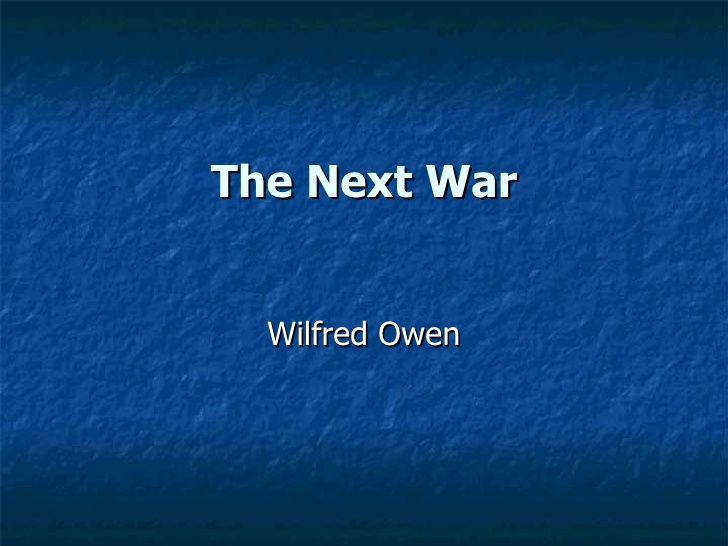
“Dulce et Decorum Est” by Wilfred Owen and “The Soldier
LibriVox volunteers bring you 22 different recordings of Dulce et Decorum Est by Wilfred Owen. This was the weekly poetry project for the week of May 18th, 2008. This was the weekly poetry project for the week of May 18th, 2008.
Wilfred Owen, “Anthem for Doomed Youth” What passing-bells for these who die as cattle? — Only the monstrous anger of the guns. Only the stuttering rifles’ rapid rattle
The poem ‘Dulce et decorum est’ by Wilfred Owen deals with both loss and deep sadness. Immediately in the poem there are very strong images being used throughout the poem and this shows the sadness from the very start. Figures of speech are …
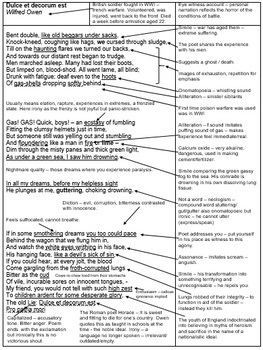
Question and answer worksheets based on Wilfred Owen info sheet, Dulce Et Decorum Est and The Last Laugh analysis.
Dulce et Decorum Est Wilfred Owen , 1893 – 1918 Bent double, like old beggars under sacks, Knock-kneed, coughing like hags, we cursed through sludge, Till on the haunting flares we turned our backs And towards our distant rest began to trudge.
“Dulce et Decorum est” – Wilfred Owen”Dulce et Decorum est” is an anti war poem in which Owen conveys the devastating effects of war on the human spirit. He effectively portrays this idea throughout the poem using various techniques such as direct diction, figurative language and imagery. Through this, Owen proves his idea of war being the ‘old lie’.
Dulce et decorum est pro patria mori translates at: “It is sweet and right to die for your country. Drunk with fatigue; deaf even to the hoots Of tired, outstripped Five-Nines that dropped behind.
Dulce Et Decorum Est was written by Wilfred Owen during World War I and is a war poem focusing on the horrors of war; the conditions of the soldiers, the wars impact on those whom remain alive and war not being glorious.
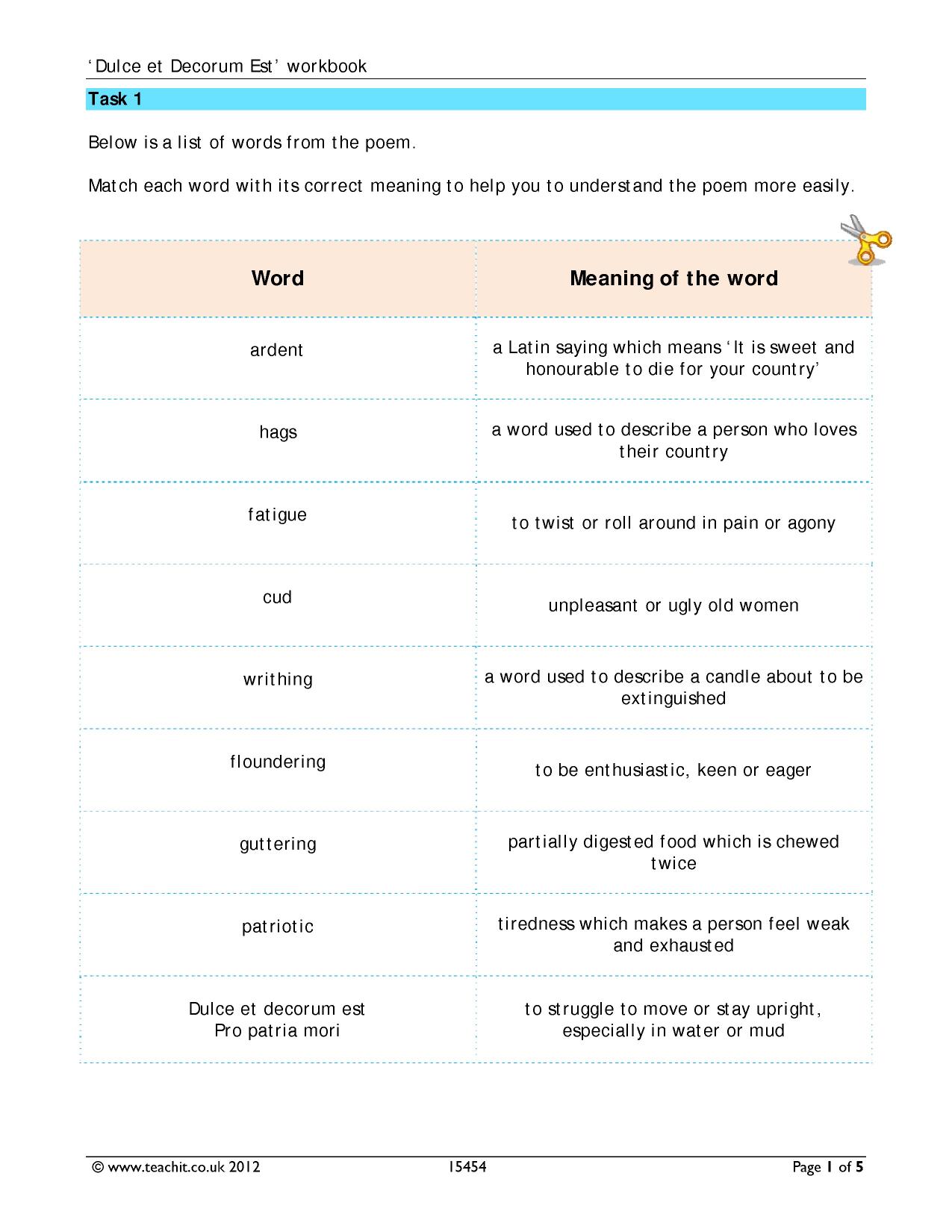
‘Dulce et decorum est’ pro patria mori’ ‘it is sweet and right’ to die for your country’ – The poem is set in the First World War against a backdrop of a battlefield scene.
8/11/2018 · Poems by Wilfred Owen/Dulce et Decorum est. From Wikisource < Poems by Wilfred Owen. Jump to navigation Jump to search. For other versions of this work, see Dulce et Decorum est. ←Insensibility. Poems by Wilfred Owen by Wilfred Owen Dulce et Decorum est. The Sentry→ sister projects: Wikipedia article. — DULCE ET DECORUM EST Bent double, like old beggars under …
International Journal of English and Education EXPRESSIONIST ANALYSIS OF WILFRED OWEN'S POEMS: ANTHEM FOR DOOMED YOUTH, DULCE ET DECORUM EST, A TERRE, FUTILITY AND STRANGE MEETING
Activity 2: Wilfred Owen – Dulce et Decorum Est Wilfred Owen enlisted in the army in 1915. In November 1918, he was killed while attempting to
Selected Poetry of Wilfred Owen – Biography and 7 poems (Anthem for Doomed Youth, Arms and the Boy, Dulce et Decorum Est, Exposure, Futility, Spring Offensive, Strange Meeting) Wilfred Owen Association
Poems by Wilfred Owen/Dulce et Decorum est Wikisource
The poem “Dolce et Decorum Est” by Wilfred Owen reflects many of the horrors experienced in the war. Dulce et decorum est / Pro patria mori” (Owen 1918). The maxim of “Dolce Decorum Est is essence means that it is honorable, glorious and “decorous” to die for one’s country and obviously, instead of confirming such a notion—one that has been ingrained in Western thought since the
This is followed by a reading of Wilfred Owen’s poem ‘Dulce et Decorum Est’. This clip is from: The Poetry of War. First broadcast: 9 June 1995. Classroom Ideas. The class could discuss in pairs
“Dulce et Decorum Est” is a work of art by Wilfred Owen composed after his encounters battling in the trenches in northern France amid World War I. “Here is a gas lyric … done yesterday,” he kept in touch with his mom from the recuperation healing center in Craiglockhart, Scotland, in 1917.
Published: Thu, 29 Jun 2017. Dulce et decorum est is a famous anti-war poet written by Wilfred Owen in 1917, during the WWI. It portrays war as a brutal and dehumanizing experience by utilizing a number of horrific, gruesome imageries effectively. – ultransmit aroma diffuser instructions The old Lie: Dulce et decorum est Pro patria mori.4 1 Wilfred Owen was only twenty years old when World War I broke out in 1914. Twice wounded in battle, Owen was rapidly promoted and eventually became a company commander. The shocking violence of modern war summoned Owen’s poetic genius, and in a two-year period he grew from a negligible minor poet into the most important English …
This essay analyses two poems from Wilfred Owen: ‘The Next War’ & ‘Dulce Et Decorum Est’ and received 17/20 This essay analyses two poems from Wilfred Owen: ‘The Next War’ & ‘Dulce Et Decorum Est’ and received 17/20 3 Exchange Credits. Add to Cart. Proceed to Cart. This is an Essay / Project Essays / Projects are typically greater than 5 pages in length and are assessments that have …
Dulce et Decorum est” is a poem written by Wilfred Owen during World War I, and published posthumously in 1920. The Latin title is taken from Ode 3.2
Copy of the poem ‘Dulce et Decorum Est’ by First World War poet Wilfred Owen. Teacher’s notes and students’ notes are combined into one easy to download document which is available as a Word or PDF file. View related resources > Curriculum Area: Expressive Arts Technologies Suitable For Levels: Second Level Tagged With: Branding Poppy. Peace Flag Design Challenge. Peace Flag Design
Welcome back to the CLEAR Education blog, where we will cover Wilfred Owen’s prescribed HSC poem ‘Dulce et Decorum est.’ We will take a closer look at the context of the poem while looking at some specific quotes, analysis and techniques.
This resource uses Wilfred Owen’s ‘Dulce et Decorum est’ as a springboard for discussion about the role and implications of allusion in poetry, an aspect of literature often overlooked with younger groups. Dulce et decorum est pro patria mori – or the “old Lie”, as Owen describes it – is a quotation from the Odes of the Roman poet Horace, in which it is claimed that “it is
17/12/2016 · Dulce et decorum est pro patria mori, which is a line taken from the latin odes of the Roman poet Horace, means it is sweet and proper to die for one’s country. In his poem, Wilfred Owen takes the opposite stance.
The narrator pledges to donate 50% of his proceeds to The Royal British Legion Poppy Day Appeal – please support. Wilfred Owen’s famous poem was written in 1917 during World War I. Dulce et Decorum Est describes the horrors of the front lines and the gruesome effect of a gas attack.
Wilfred Owen’s Dulce Et Decorum Est is a compelling poem trying to depict the helplessness of soldiers caught in a Gas Chamber. The poet describes the general condition of the men involved in the war, their condition after a shock of a gas attack and then describing the effect of …
Dulce Et Decorum Est In the two poems “Dulce et Decorum Est,” by Wilfred Owen and “The Death of the Ball Turret Gunner,” by Randall Jarrell, a common theme is expressed among the two. The expendability of life in warfare is that theme.
Dulce Et Docorum Est by Wilfred Owen The World War One poet, Wilfred Owen, wrote two poems named ‘Dulce Et Decorum Est’ and ‘Disabled’. The main themes running throughout both poems are that of the pain and worthlessness of war, and the crime towards the young soldiers it was.
Brief summary of the poem Dulce et Decorum Est It’s just another day on the battlefields of World War I. As our speaker lets us know right away, however, “normal” isn’t a word that has any meaning for the soldiers anymore.
Dulce et Decorum Est Red Lodge Public Schools / Overview
Wilfred Owen was a conscientious objector, who never believed in war. Owen believed he had no right to protest against war, if he had never fought in it. Owen wrote his anti-war poem “Dulce et Decorum Est” as a protest against war, particularly a poem by Jessie Pope, declaring that it is sweet and honourable to die for your country. Owen denounces this lie. In the words of the great
Reading “Dulce et Decorum Est” may not be a walk in the park. But Owen’s struggling with a difficult issue: he’s trying to get a country to pay attention to the fact that people are dying. Whether or not you support of a particular war (or even war in general), it might be a …
“Dulce et Decorum Est” and “Anthem for… In the poem “Dulce et Decorum Est”, Wilfred Owen aims to illustrate the truth about the war. He wants to show people the difference between what happened in the trenches and the lie being told at home.
Wilfred Owen immortalized mustard gas in his indictment against warfare, Dulce et Decorum Est. Written in 1917 while at Craiglockart, and published posthumously in 1920, Dulce et Decorum Est details what is perhaps the most memorable written account of a mustard gas attack.
Wilfred Owen Anthem for Doomed Youth Dulce et Decorum Est

Dulce Et Decorum Est Poetry Unrest Scribd
Dulce Et Decorum Est and Anthem for Doomed Youth Essay Sample. In the two poems, Dulce et Decorum est., and Anthem for Doomed Youth, both written by Wilfred Owen, the author’s main purpose was to expose the true horrors of World War II and to challenge the romanticized view of war that poets such as Rupert Brooke held.
Wilfred Owen’s argument in “Dulce et Decorum Est” Wilfred Owen, the poet of “Dulce et Decorum Est” was a British soldier who fought during World War 1. His poem was published in 1920 which was after his death in 1918. The title of the book is in Latin and it was taken from Homer’s Iliad and Horace’s line from ode 3.2 and it one of the most famous quotations from roman literature
28/02/2014 · An animated adaption of Wilfred Owen’s harrowing poem ‘Dulce Et Decorum Est’, to mark the 100th year anniversary of the First World War. …
Wilfred Owen. The old Lie Dulce et decorum est; Pro patria mori’ This means It is sweet and honourable to die for ones country, and its sweet and proper to die for the fatherland.
In Wilfred Owen’s poem, “Dulce et Decorum est,” Wilfred Owen uses vivid imagery to contrast the rhetoric of the ideal and the horror of the reality. Owen’s poem provides dramatic imagery to focus on the nightmare’s soldiers, has now been effected with for the sake of protecting one’s country.
Dulce et Decorum Est Wilfred Owen Free Download

Analysis of Dulce et Decorum Est by Wilfred Owen
Study Questions for Wilfred Owen’s “Dulce et Decorum Est” Vocabulary: allusion, imagery, modernism, trench poets, verbal irony
The Poet as Rhetor: A Reading of Wilfred Owen’s “Dulce et Decorum Est” Stephen Benz Journal of Modern Literature, Volume 41, Number 3, Spring 2018, pp. 1-17
Dulce et Decorum est by Wilfred Owen “Dulce et decorum est” is a poem written by the poet Wilfred Owen during the First World War. It was written to portray the reality of war. In it he describes the horrors he witnessed as a soldier from the front line of battle. The aim of the poem was to tell people that Jessie Pope, a poet who was encouraging young men to go to war because it was glorious
– Analysis of “Dulce et Decorum Est” by Wilfred Owen Based on the poem of “Dulce et Decorum Est”, by Wilfred Owen. Owens war poetry is a passionate expression of outrage at the horrors of war and of pity for the young soldiers sacrificed in it. It is “Dulce et Decorum Est” which provides a very dramatic and memorable description of the psychological and physical horrors that war brings about
Dulce Et Decorum Est Free Essays PhDessay.com
A commentary on one of the most famous war poems ‘Dulce et Decorum Est’ or, to give the phrase in full: Dulce et decorum est pro patria mori, Latin for ‘it is sweet and fitting to die for one’s country’ (patria is where we get our word ‘patriotic’ from).
Aoife O’Driscoll www.aoifesnotes.com Page 1 Dulce et Decorum Est by Wilfred Owen Bent double, like old beggars under sacks,
Dulce et decorum est pro patria mori – see note 1 above. These notes are taken from the book, Out in the Dark, Poetry of the First World War , where other war poems that need special explanations are similarly annotated.
dulce et decorum est- wilfred owen Dulce Et Decorum was a poem written by Wilfred Owen when he was in hospital. It is a poem that is most commonly known because of the bitter truth that Owen …
Essay Analysis Of Wilfred Owen ‘s ‘ Dulce Et Decorum Est ‘ that Wilfred Owen is the greatest author of war poetry in the English language”. Wilfred Owen was a …
PEE Assessment Throughout the poem of ‘Dulce et Decorum Est,’ by Wilfred Owen, there are many examples of poetic techniques which he has used for instance similes and adjectives, such as “His hanging face, like a devil’s sick of sin.”
Dulce et Decorum est, by Wilfred Owen. The First World War was an event that brought to many people, pain, sorrow and bitterness. Accounts of the war shows that no other war challenged existing conventions, morals and ideals in the same way as did World War.
the soul-shocking contrast offered by Wilfred Owen in “Dulce Et Decorum Est” between the idealistic way in which the war was viewed by outsiders – “Dulce et decorum est / Pro Patria mori” – and the bloody actuality of its trench-bound, gas-infected battles – “Gas!
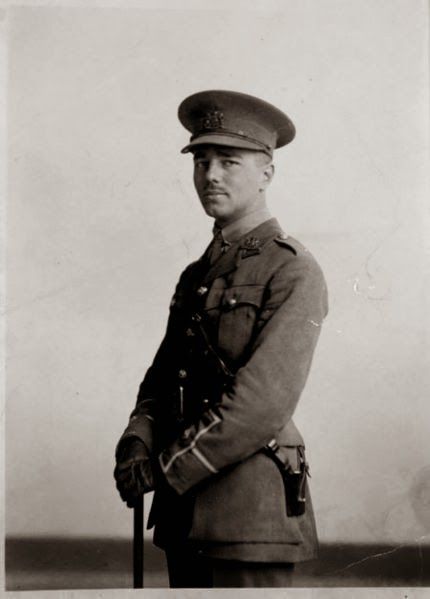
In “Dulce Et Decorum Est”, Owen expresses his reaction to the war by using the seemingly perfect traditional poetic form with deliberate imperfect execution suggesting the topsy-turvy situation of war. Owen’s violation of the conventional poetic form coveys the break down of society’s value system that has been trusted for long. The awful images he uses in the poem effectively convey
The Latin phrase “Dulce et decorum est pro patria mori,” which lends the poem its title and concluding lines, comes from a poem of Horace, writing under the emperor Augustus Caesar. It means, “It is sweet
I enjoyed reading poems by Wilfred Owen in one of my poetry classes and since I learned about his amazing style in writing war poetry, I find his poetry to be intriguing and thought provoking. Dulce Et Decorum Est is one of my favorite poems by Wilfred Owen.
‘Dulce et Decorum Est’ is a poem by the British poet Wilfred Owen, drafted at Craiglockhart War Hospital near Edinburgh in 1917. Owen had been admitted to the hospital after suffering from shell shock after a period of fighting in the Battle of the Somme.
Dulce et Decorum Est by Wilfred Owen Bent double, like old beggars under sacks, Knock-kneed, coughing like hags, we cursed through sludge, Till on the haunting flares we turned our backs
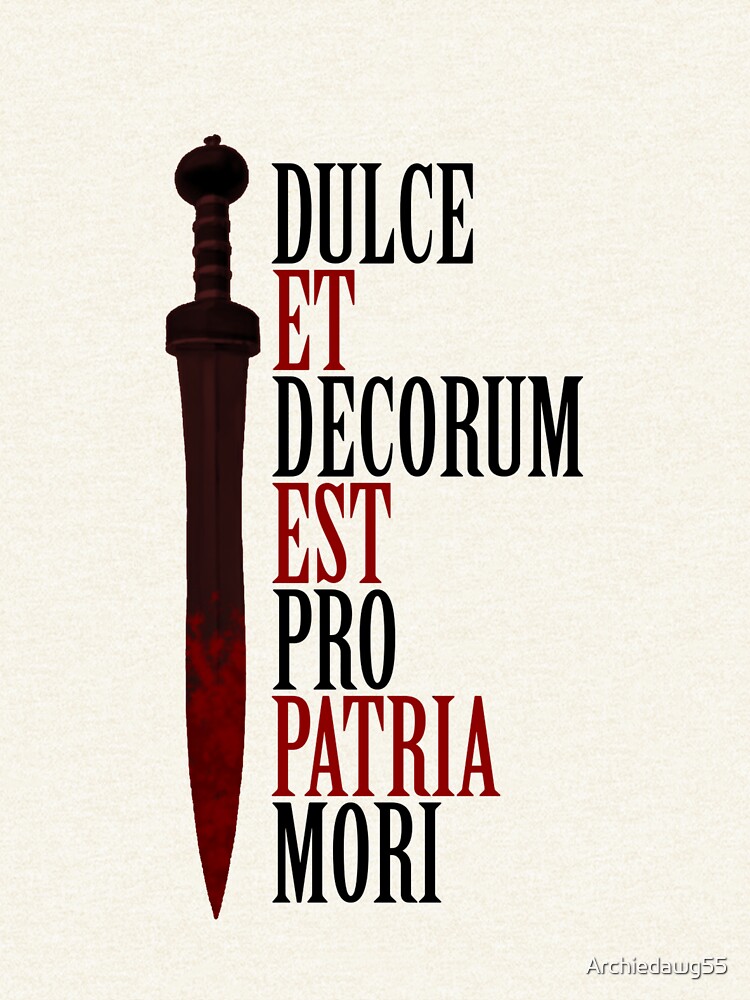
The two poems “Dulce et Decorum Est” by Wilfred Owen and “The Soldier” by Rupert Brooke. Compare how the poets have used techniques and ideas to convey there attitudes to war. Compare how the poets have used techniques and ideas to convey there attitudes to war.
Home Study Guides Wilfred Owen: Poems “Dulce et Decorum est” Summary and Analysis Wilfred Owen: Poems by Wilfred Owen. Buy Study Guide Wilfred Owen: Poems Summary and Analysis of “Dulce et Decorum est” Buy Study Guide. Summary. The boys are bent over like old beggars carrying sacks, and they curse and cough through the mud until the “haunting flares” tell them it is time to …
Dulce et Decorum Est Shmoop
https://vi.wikipedia.org/wiki/Dulce_et_Decorum_Est
Dulce et Decorum Est Summary eNotes.com
– Review of Dulce Et Decorum Est by Wilfred Owen Papers
Dulce Et Decorum Est Poem by Wilfred Owen Poem Hunter


(PDF) International Journal of English and Education
Dulce Et Decorum Est Commentary UK Essays UKEssays
Dulce et Decorum est by Wilfred Owen. Essay Bartleby.com
Dulce et Decorum Est Essay Example Graduateway
Wilfred Owen’s Dulce Et Decorum Est is a compelling poem trying to depict the helplessness of soldiers caught in a Gas Chamber. The poet describes the general
Essay Analysis Of Wilfred Owen ‘s ‘ Dulce Et Decorum Est ‘ that Wilfred Owen is the greatest author of war poetry in the English language”. Wilfred Owen was a …
Aoife O’Driscoll www.aoifesnotes.com Page 1 Dulce et Decorum Est by Wilfred Owen Bent double, like old beggars under sacks,
Dulce Et Decorum Est and Anthem for Doomed Youth Essay Sample. In the two poems, Dulce et Decorum est., and Anthem for Doomed Youth, both written by Wilfred Owen, the author’s main purpose was to expose the true horrors of World War II and to challenge the romanticized view of war that poets such as Rupert Brooke held.
‘Dulce et decorum est’ pro patria mori’ ‘it is sweet and right’ to die for your country’ – The poem is set in the First World War against a backdrop of a battlefield scene.
Dulce et Decorum Est Wilfred Owen , 1893 – 1918 Bent double, like old beggars under sacks, Knock-kneed, coughing like hags, we cursed through sludge, Till on the haunting flares we turned our backs And towards our distant rest began to trudge.
The Poet as Rhetor: A Reading of Wilfred Owen’s “Dulce et Decorum Est” Stephen Benz Journal of Modern Literature, Volume 41, Number 3, Spring 2018, pp. 1-17
Home Study Guides Wilfred Owen: Poems “Dulce et Decorum est” Summary and Analysis Wilfred Owen: Poems by Wilfred Owen. Buy Study Guide Wilfred Owen: Poems Summary and Analysis of “Dulce et Decorum est” Buy Study Guide. Summary. The boys are bent over like old beggars carrying sacks, and they curse and cough through the mud until the “haunting flares” tell them it is time to …
6/10/2012 · Part 1 of the line by line analysis of Wilfred Owen’s ‘Dulce Et Decorum Est’. Created by P. Dunning.
Dulce et decorum est pro patria mori – see note 1 above. These notes are taken from the book, Out in the Dark, Poetry of the First World War , where other war poems that need special explanations are similarly annotated.
Dulce Et Decorum Est Commentary UK Essays UKEssays